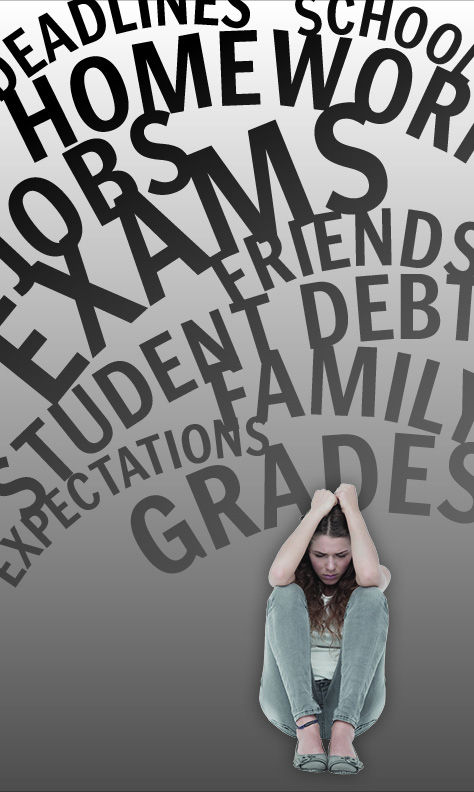Fighting anxiety: Students discover support through ISU Student Counseling Services
Illustration: [email protected]
Anxiety
September 23, 2014
It feels as though a comet struck from out of nowhere. Heavy breathing. Rapid heart rate. The only cure is air.
But there is no relief until the panic attack ends.
Anxiety is an emotion experienced by everyone at some point. However, when this emotion begins to prevent one’s ability to lead a normal life, it becomes a completely different ballgame.
This anxiety has metamorphosed into a disorder some students deal with on a day-to-day basis. Students who combat anxiety disorders are usually in constant worry or fear of certain surroundings and situations.
It can be hard for some individuals to tell whether they are reacting to situations out of normal anxiety and everyday stressors or if this emotion has unraveled itself into a taunting roadblock.
“I thought that if you were mentally strong enough, you could just get through it,” said Jacob Gannon, an ISU football player who walked away from the program after experiencing a panic attack due to anxiety.
Gannon left to seek answers for the disorder and returned to the team 11 days later. He now participates in biofeedback — a technique used to control body functions and heart rate — twice a week for an hour and has been working with Marc Shulman, a staff physician at Thielen Student Health Center.
“People who experience anxiety often may have symptoms including excessive worry, difficulty concentrating, feelings of restlessness, being easily fatigued, irritability, muscle tension and sleep disturbance,” said Tiffany Iskander, a staff psychologist at the Student Counseling Center.
In regards to anxiety disorders, there are four main types that many people face. Even though there are some commonalities between these types, each disorder has its own specific symptoms and triggers that affect ones general quality of life.
“Anyone experiencing severe anxiety should know that it is highly treatable,” said Rebecca Houser, ISU alumnus and licensed professional counselor. “Anxiety disorders are the most common mental illness in the U.S. and affect approximately 40 million Americans.”
Psychological treatment is a common next step if diagnosed with a severe case of anxiety. For those who are combating a severe case alone, Iowa State’s Student Counseling Services offers a variety of classes and biofeedback programs free of charge for all students. If a student doesn’t know whether or not he or she is combating this disorder, counseling services and Marc Shullman both encourage a visit.
“Anxiety is all about how you control it. It is important to know that you do have the power to control it and that’s why there are resources like SCS out there to help you do so,” Shullman said. “Situational stress and anxiety are either adapted to, accepted or relieved.”
Shullman strongly encourages students who struggle with both severe anxiety or regular anxiety to participate in the biofeedback program, set up a daily planner to help with organization and seek medication as the last resort.
Shullman said the most common anxiety students may see is the transition into a college environment.
Mild disorders can either become worse or reversed if they are not treated. Even though the anxiety disorder conversation has become widespread across the nation, the most common type of anxiety among students is actually because of situational circumstances and everyday stressors.
It is only when the symptoms of common anxiety become severe enough that an actual disorder is diagnosed.
“Anxiety is a normal part of the human experience; it can warn us that we are in danger or alert us to an area of our life that is in need of attention,” Houser said. “Without some anxiety, most students would lack the motivation required to study for exams, write papers or do daily homework.”
Being in college can make students susceptible to anxiety and is a normal reaction to common day stressors. But it’s also important to know that there are certain ways to deal with this emotion when it starts to overshadow the rest.
“In our department, we encourage exercising, eating healthy and connecting with positive activities that you love. Essentially, it is important to find an outlet to your anxiety,” said Deb Sharar, academic adviser in kinesiology. “We all find things we can connect with that fulfill us and make us happy.”
Anxiety is a part of everyday life. But if any of these symptoms become severe enough, checking in with SCS about treatments for anxiety may be a good option. SCS can help students figure out new ways of coping and different treatment options that may help their anxiety, including biofeedback and group and individual therapy.
“I feel like every student and student-athlete goes through some type of anxiety,’” said Brittany Williams, former ISU track athlete and junior in kinesiology. “Being a student, and especially student-athlete, is crazy. I think it’s just how you learn to deal with it and finding methods to help you cope.”







